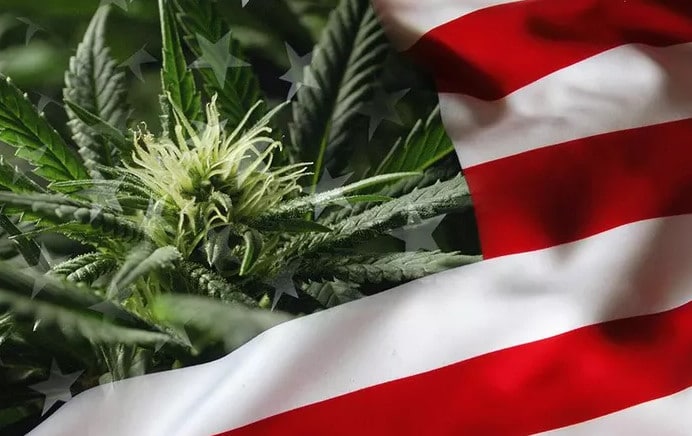In the cannabis world, New York lawmakers are grappling over whether to use legal weed taxes to fund subways or social justice, while Denver is working on clearing former pot offenders’ records, and hemp moves one more step toward legality.
At long last, it seems like legal pot in New York is becoming less of a pipe dream and more of an inevitability. Lawmakers are currently hard at work drafting a legalization bill, and rumor has it that Gov. Andrew Cuomo is planning on including legal pot tax revenue in next year’s budget proposal. Legal weed could bring the Empire State billions each year, and lawmakers must now decide whether to use that cash to fix New York City’s antiquated subway system or to reinvest it in communities that have been ravaged by decades of prohibition.
Across the country, Denver is taking its own steps toward social justice. Last week, Mayor Michael Hancock announced that the city may clear over 10,000 low-level cannabis convictions dating back to 2001. And in Utah, activists are suing to overturn a new law that imposes several restrictions on the state’s brand-new medical marijuana program, which was just approved by voters last month. Hemp is also one step closer to becoming legal this week, now that GOP Senate leader Mitch McConnell has signed the final version of the 2018 Farm Bill (with a hemp pen, no less.)
While individual U.S. states are working to reform cannabis laws piece by piece, global progress towards cannabis reform is advancing at a slower pace. Last week, the United Nations was expected to announce the results of a months-long investigation into whether international restrictions on cannabis should be relaxed, but the unveiling of the results has now been put off indefinitely. In other news, one of America’s largest cannabis companies is being sued by former employees for alleged violations of several labor laws. Let’s dig in.
New York Debates Whether to Use Pot Taxes to Fund Subways or Social Justice
Next year may be the year that New York finally goes green, now that two of the major hurdles blocking the road to legal weed have been swept aside. During last month’s midterm elections, Democrats regained control of the state Senate, overtaking a Republican majority that has stood in the way of cannabis reform for years. And after years of calling pot a “gateway drug,” Gov. Cuomo has apparently come full circle on the issue, and may even be including pot tax revenue in next month’s budget proposal, which would allow the state to set up a fiscal framework for legal sales as soon as April.
Lawmakers are currently hard at work drafting the fine details of an adult-use legalization bill, but still have a number of important issues to hash out, including what to do with the $750 million in tax revenue that legal sales are expected to bring the state. A new report by New York University’s Rudin Center for Transportation Policy and Management has recommended that the state use this income to shore up New York City’s antiquated subway system, and several other lawmakers are now rallying behind this position.
Over 5.5 million people ride the NYC subways every weekday, and the city’s Metropolitan Transportation Authority (MTA) has been failing to keep trains running smoothly enough to serve their ridership. This is a major concern for NYC residents and politicians alike, and the NYU report “argues that the subways need a dedicated revenue source with the potential for growth in future decades… The legalization of recreational cannabis offers New York State a unique opportunity to generate a new revenue stream dedicated to mass transit.”
But as nice as it would be to modernize the Big Apple’s subways, cannabis advocates are arguing that public transit should take a back seat to social justice. In a recent op-ed in the New York Daily News, Drug Policy Alliance deputy director Melissa Moore argued that pot revenue should “be directed to marginalized communities, and the people first in line need to be the people who have been ravaged by overpolicing and impacted by other insidious criminalization.” The current draft of the legalization bill does address this issue, however, directing 50% of all legal pot tax revenue back to neighborhoods most negatively impacted by prohibition.
Denver Working to Clear Low-Level Cannabis Convictions
Thousands of former cannabis offenders in Denver may now have the chance to clear their records for good, thanks to a joint effort between Mayor Michael Hancock and the city’s attorneys and courts. Unlike California, the ballot measure that legalized weed in Colorado did not include measures to help former offenders clear their records, but individual jurisdictions still have the power to clear these records themselves. Last week, Hancock’s office announced that they were working to automatically clear the records of over 10,000 Denver residents who were convicted of minor pot offenses between 2001 and 2013.
“For too long, the lives of low-income residents and those living in our communities of color have been negatively affected by low-level marijuana convictions,” Hancock said in a statement, Westword reports. “This is an injustice that needs to be corrected, and we are going to provide a pathway to move on from an era of marijuana prohibition that has impacted the lives of thousands of people.” The mayor’s office is also considering means to allocate pot tax revenue to lower-income neighborhoods and to promote minority participation in the city’s cannabis industry.
Hancock actually has a history of opposing cannabis reform, voting against several decriminalization efforts during his former role on the Denver City Council and publicly opposing Colorado’s push for legalization. This summer, it became clear that the mayor had changed his opinion when he joined six other mayors in writing a letter to Congress demanding that cannabis be removed from the Controlled Substances Act. Cannabis advocate Mason Tvert grudgingly acknowledged Hancock’s sudden change of heart, calling it “better late than never.”
Utah Activists Suing the State to Overturn “Compromise” Medical Marijuana Bill
Activists have been fighting to bring medical marijuana to the Beehive State for years now, and the battle is not over yet. Last month, Utah voters approved Proposition 2, a ballot measure to create a comprehensive medical cannabis program, despite fierce opposition from DEA-funded lobbying groups, the Church of Jesus Christ of Latter-day Saints (LDS), and Gov. Gary Herbert. Concerned that the initiative was too progressive, the latter two groups put pressure on state lawmakers to create a new, more restrictive medical marijuana bill.
Just one business day after Proposition 2 came into effect, legislators convened a special session to pass their compromise bill. This new law imposes several restrictions not included in the ballot initiative, including a decrease in the total number of dispensaries from 40 to 7, a ban on almost all forms of edibles, and fewer qualifying conditions. “This bill is undoubtedly inferior to the law enacted by voters in November,” Marijuana Policy Project deputy director Matthew Schweich said in a statement.
Two local advocacy groups are now suing to overturn the new compromise law, arguing that it “unconstitutionally undermines or entirely defeats core purposes of Proposition 2” and “severely reduces or eliminates” patients’ access to their medicine, Deseret News reports. “Anything that defeats the right of the people to pass their own legislation under our constitution should be declared unconstitutional,” Rocky Anderson, attorney for one of the plaintiffs, told FOX13. “Otherwise it’s totally illusory.” The lawsuit also alleges that the LDS Church’s involvement in the legislative process violates the state constitution, which mandates separation of church and state.
Sen. Mitch McConnell Signs Final Farm Bill, Bringing Hemp One Step Closer to Legality
This week, Senate Majority Leader Mitch McConnell signed the final version of the 2018 Farm Bill, making it likely that hemp will be legal by the end of this year. McConnell personally fought to add a provision to this year’s agricultural bill that will legalize industrial hemp and all hemp-derived products – including CBD. The House passed a version of the bill without the hemp legalization language, but McConnell fought for its inclusion in the final version, which he signed this Monday using a hemp pen.
“Making it official with my hemp pen,” the GOP leader tweeted. “With today’s signature, my provision to legalize industrial hemp is 1 step closer to reality. Looking forward to voting YES on this bill & sending to [President Donald Trump].”
Later on Tuesday, December 11th, the bill was approved by the Senate. Now, it will be sent to the House for a vote before going to the president’s desk for a signature. Insiders are optimistic that this will all be completed before the end of the year.
United Nations Committee Delays Cannabis Rescheduling Recommendation
Last Friday, the United Nations was expected to unveil a new set of recommendations regarding the international legality of cannabis, but instead chose to table these discussions for the foreseeable future. The UN currently classifies cannabis as one of the most dangerous drugs in the world, but as more countries legalize, the organization has decided to reconsider this classification. A pre-review released by the World Health Organization (WHO) this spring included several positive findings regarding the safety of cannabis use, which prompted UN officials to take a more in-depth look.
The UN Commission on Narcotic Drugs (CND) was expected to provide new cannabis scheduling recommendations based on the results of this study last week, but made a surprise decision to postpone the unveiling indefinitely. “This decision to withhold the results of the critical review of cannabis appears to be politically motivated,” Michael Krawitz, executive director of Veterans for Medical Cannabis Access, told Marijuana Moment. “I hope the WHO shows courage and stands behind their work on cannabis, findings we expect to be positive based upon recent WHO statements and their other actions today.”
The CND has not released a new date for their announcement, but their recommendations must be given before March, when member countries will vote on whether to reschedule cannabis. If approved, this historic change would remove many hurdles standing in the way of global legalization. “The immediate results of a softening of the status of cannabis within the international drug control conventions could include easier international trade, better access for patients, increased research and clarity that CBD isn’t a controlled substance at all,” Krawitz explained to Marijuana Business Daily.
Former MedMen Employees File Class Action Lawsuit Over Unfair Labor Practices
MedMen, a cannabis giant that has opened 19 licensed marijuana businesses in California, New York, and Nevada since 2010, is now facing a class-action lawsuit from its employees that could cost the company millions. Chelsea Medlock and Anthony Torres, two former employees at MedMen’s West Hollywood location, have accused the company of failing to pay employees minimum wage for work performed off the clock, not paying overtime or keeping proper records of all hours worked, and failing to provide required meal and rest breaks. The plaintiffs’ attorney, Daniel Srourian, has asked the court to grant class-action status to the lawsuit, which would allow every MedMen employee to join in.
If the class-action request is granted, the suit could become “a potentially multimillion-dollar problem” for the company, San Francisco attorney Katy Young told High Times. “Class actions are very serious to deal with, and if the class gets certified, it’s a real problem for the employer,” she added. “Wage and hour issues are very serious as there are penalties. Not only are there liabilities for what you didn’t pay, sometimes there are treble damages.”
This is not MedMen’s first brush with controversy over its labor practices – the chain’s upscale 5th Avenue location in New York location was criticized by activists for failing to commit to diverse and inclusive hiring practices or taking other steps to address social justice issues.
Credit: merryjane.com











